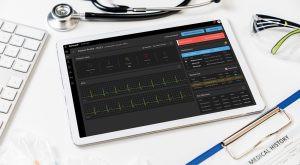Digital health market of Saudi Arabia and UAE to reach $4 billion by 2026 says Honeywell

With the regional healthcare industry witnessing increasing demand for advanced technologies and innovation, Honeywell reveals some of the top trends in the MedTech industry that will help healthcare providers meet this surge in demand and face ongoing cost-control pressures. Healthcare spending in the GCC is forecasted to reach $99.6 billion in 2023 with the UAE and Saudi Arabia commanding 80% of total spending.
According to a separate report, the combined digital health market of Saudi Arabia and the UAE is estimated to reach USD 4 billion by 2026, with both nations using digital health solutions to benefit patients and improve outcomes in areas including chronic disease management, diagnostics and preventative care. Greater MedTech adoption is expected to make healthcare practitioners’ lives easier, making them more efficient, productive and effective at supporting patient wellbeing.
According to Honeywell, there are two types of MedTech that will be essential for the growth of this market. One, technology that enables a proactive approach to healthcare, and second, systems that can streamline and automate processes in the hospital environment.
Technology that enables a proactive approach to healthcare
Despite the numerous challenges that the healthcare industry faces today, there is immense opportunity in properly leveraging advanced technologies. With sensing technology, for example, data can be captured and harnessed for predictive insight into healthcare delivery. Wearable devices provide real-time patient monitoring and recording of vital signs data to make routine tasks by healthcare professionals easier, improving the experience of patients. Health analytics dashboards are updated to alert of any potential issues, enhancing worker productivity and enabling process efficiency. This makes healthcare data more widely available, irrespective of whether a patient is in a hospital, health center or even at home, helping identify health problems that may need to be addressed so patients can take action at an earlier stage.
Systems that streamline and automate processes
In hospital environments, the data captured by sensing technologies can feed into other MedTech solutions like bed management systems and integrated nurse call systems. Collectively, these technologies can help increase the bandwidth of doctors, nurses and caregivers, while enhancing the quality of that care in the process by reducing errors. For instance, deploying more advanced MedTech will bring benefits for healthcare providers and patients alike — the current industry conditions make it likely that 2023 will be a turning point for the roll out of these technologies. Mobile devices have powerful built-in scanners that help simplify daily tasks by helping find Electronic Medical Records (EMR). Error-free scanning saves hours of administrative tasks, improves clinical workflows and ensures high-quality patient care. Additionally, Real-Time Health Monitoring Systems (RTHMS) enable nurses to monitor multiple patients at once, streamlining workflows for better accuracy and caregiver communication.
“Advanced Honeywell technology is helping today’s MedTech industry by boosting efficiency and productivity at a time of great challenges with rising healthcare demands. Our digital health solutions harness the power of data to enable decisive and earlier interventions to enhance the quality of care for patients. We look forward to continuing to support patients’ wellbeing and practitioners’ understanding of how they can successfully incorporate technology as well as automated processes to reduce errors and improve outcomes,” said Charbel Rizkallah, senior healthcare director, Honeywell Sensing & Safety Technologies.







